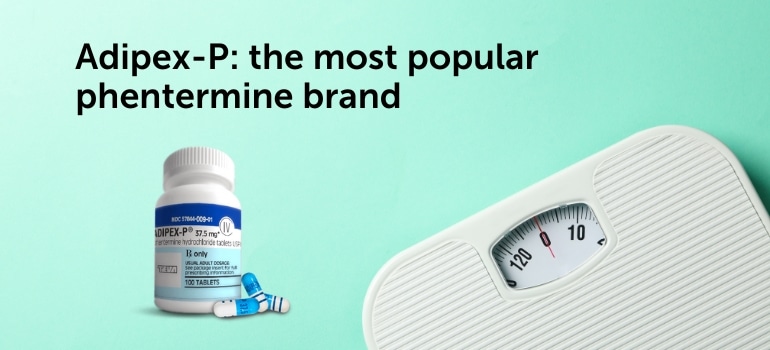What is Adipex?
Adipex, or Adipex-P, is a prescription medication containing phentermine hydrochloride. This drug is primarily used as a short-term treatment for obesity, helping individuals reduce their appetite and increase their energy levels.
How Does Adipex Work?
With its active ingredient, phentermine HCL, Adipex is a sympathomimetic amine that aids in weight loss by stimulating the central nervous system. This stimulation leads to the release of norepinephrine, which increases energy levels and reduces feelings of hunger.
Additionally, Adipex triggers the release of adrenaline, promoting the breakdown of stored fat in the body. The medication is most effective with a healthy diet and regular physical activity.
Who Should Take Adipex?
To be eligible for Adipex, patients must meet specific body mass index (BMI) requirements. Specifically, Adipex is prescribed to individuals with a BMI of 30 kg/m² or higher. It can also be prescribed to those with a BMI of 27 kg/m² or higher if they have weight-related complications such as hypertension, type 2 diabetes, or hyperlipidemia.
Prescription Requirements
Adipex is a Schedule IV controlled substance, meaning it has a potential for abuse and dependence. Therefore, it can only be obtained with a prescription from a healthcare provider. This ensures that the medication is used safely and appropriately. Patients must undergo a thorough medical evaluation to determine if Adipex suits them. This evaluation includes reviewing their medical history, current health conditions, and any other medications they may be taking.
Dosage and Administration
The typical recommended dosage of Adipex is 37.5 mg of phentermine hydrochloride per day, prescribed to maximize weight loss benefits while minimizing side effects. Phentermine is intended for short-term use only.
The drug is available as tablets and capsules. The tablets are blue and white, oblong, and scored, while the capsules have a blue cap and white body imprinted with “ADIPEX-P” and “37.5.”


Adipex can be taken with or without food, usually once daily, either 30 minutes before breakfast or 1-2 hours after breakfast. For sustained effects, the tablet can be split into two doses—morning and early afternoon.
It is crucial always to follow the prescribed dosage to avoid severe side effects and potential overdose.
Weight Loss Results
Adipex is highly effective for weight loss, with users typically losing 3-5 pounds per month when combined with a low-calorie diet and regular exercise.
Clinical trials have shown that taking 37.5 mg of phentermine for three months helped half the participants lose at least 10% of their baseline body weight (
Potential Side Effects

Adipex, like generic phentermine, comes with a range of common side effects. Users frequently report insomnia, dry mouth, constipation, and an increased heart rate. These side effects are generally mild and diminish as the body adjusts to the medication. However, it is essential to monitor these symptoms and consult a healthcare provider if they persist or worsen.
While severe side effects are less common, they can occur and require immediate medical attention. Adipex carries a risk of addiction and dependence, particularly with long-term use. Cardiovascular issues such as elevated blood pressure, heart palpitations, and even hypertensive crises can arise, especially when combined with alcohol or monoamine oxidase inhibitors (MAOIs). These severe reactions underscore the importance of using Adipex under strict medical supervision.
Safety and Precautions
Adipex is not suitable for everyone. Phentermine is contraindicated for individuals with glaucoma, severe heart problems, uncontrolled high blood pressure, or a history of drug abuse. These conditions can be exacerbated by the stimulant effects of phentermine, leading to serious health risks. Additionally, Adipex should not be used by pregnant or nursing women due to potential harm to the baby.
Adipex can interact with various substances, including alcohol and other medications. Combining Adipex with alcohol can increase the risk of adverse reactions such as hypertensive crisis and cardiovascular issues. It also interacts with monoamine oxidase inhibitors (MAOIs), which can lead to dangerous increases in blood pressure. Patients should inform their healthcare provider about all their medications and supplements to avoid harmful interactions.
Cost and Availability
Adipex is generally more expensive than its generic counterpart, phentermine. A 30-day supply of Adipex tablets ranges from $68 to $74, while the capsules cost between $69 and $87. In contrast, generic phentermine 37.5 mg tablets are significantly cheaper, ranging from $9 to $19 for a 30-day supply. This substantial price difference makes generic phentermine a more affordable option for many users.
Adipex and generic phentermine are available at most pharmacies, but a prescription is required due to the controlled nature of the medication. You can obtain a prescription from your healthcare provider or a weight loss clinic.
Comparison with Other Weight Loss Drugs
Adipex is often compared to other weight loss medications like Adderall and Didrex.
While Adderall contains amphetamine and dextroamphetamine and is primarily used to treat ADHD, it is not FDA-approved for treating obesity. Adipex, on the other hand, is approved explicitly for short-term obesity treatment and carries a risk of addiction, similar to Adderall, but is intended for short-term use only.
Didrex, another weight loss medication containing benzphetamine, is also used for short-term appetite suppression. Unlike Adipex, which is taken once daily, Didrex can be taken one to three times daily, depending on the patient’s needs. Both medications stimulate the central nervous system to suppress appetite and increase energy expenditure, but their dosing schedules and costs can vary significantly.
Final Thoughts on the Effectiveness and Safety of Adipex for Weight Loss
Adipex has proven to be an effective short-term weight loss aid for many individuals, helping them achieve significant weight loss when combined with diet and exercise. However, its use is accompanied by potential side effects and risks, including cardiovascular issues and the possibility of addiction. It is crucial for users to follow their healthcare provider’s guidance and to adopt sustainable lifestyle changes to maintain weight loss after discontinuing the medication.
1. Kim, K. K., Cho, J., Kang, C., Youn, B., & Lee, R. Effects on weight reduction and safety of short-term phentermine administration in Korean obese people. Yonsei Medical Journal. 2006; 47: 614-625. .
2. Kim, H. O., Lee, J. A., Suh, H. W., Kim, Y. S., Kim, B. S., Ahn, E. S., Roh, Y. J., Jung, S. G., Kim, J. M., Kang, M. K., Ahn, I. S., & Park, Y. G. Postmarketing surveillance study of the efficacy and safety of phentermine in patients with obesity. Korean Journal of Family Medicine. 2013; 34(5): 298-306.

